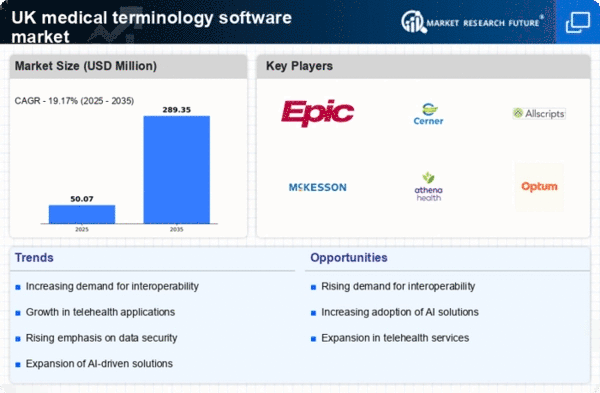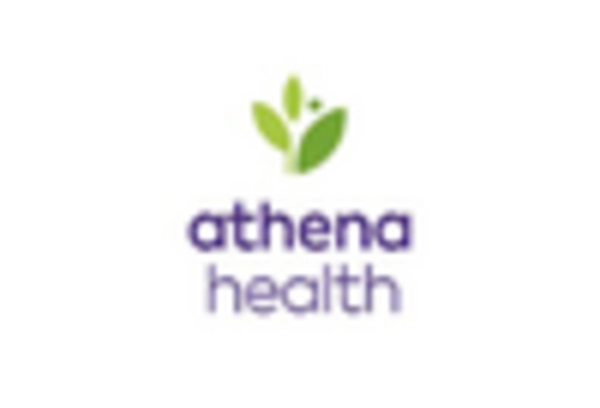Expansion of Telehealth Services
The expansion of telehealth services is significantly influencing the medical terminology-software market. As healthcare providers increasingly adopt remote consultation models, the need for software that can accurately convey medical terminology in a virtual environment becomes paramount. This shift is not only enhancing access to healthcare for patients in remote areas but also necessitating the development of user-friendly software solutions. The UK government has reported a 50% increase in telehealth consultations over the past year, indicating a robust trend towards remote healthcare delivery. This growth is likely to drive demand for medical terminology software that can facilitate effective communication between healthcare providers and patients, ensuring that medical information is conveyed clearly and accurately during virtual consultations.
Rising Demand for Digital Health Solutions
The medical terminology-software market is experiencing a notable surge in demand for digital health solutions. This trend is driven by the increasing adoption of electronic health records (EHRs) and telemedicine platforms across the UK. As healthcare providers seek to enhance patient care and streamline operations, the integration of medical terminology software becomes essential. According to recent data, the UK healthcare sector is projected to invest approximately £2 billion in digital health technologies by 2026. This investment is likely to bolster the medical terminology-software market, as healthcare professionals require efficient tools to manage and interpret complex medical data. Furthermore, the growing emphasis on patient-centric care is pushing providers to adopt software that can accurately translate medical terminology into understandable language for patients, thereby improving communication and engagement.
Increased Focus on Data Security and Privacy
In the context of the medical terminology-software market, the heightened focus on data security and privacy is a critical driver. With the rise of cyber threats and data breaches in the healthcare sector, UK healthcare organizations are prioritizing the implementation of robust security measures. The General Data Protection Regulation (GDPR) mandates strict compliance regarding patient data handling, which necessitates the use of secure medical terminology software. As a result, software solutions that offer advanced encryption and data protection features are becoming increasingly sought after. The UK government has allocated significant resources to enhance cybersecurity in healthcare, with an estimated £1.5 billion earmarked for digital security initiatives. This investment is likely to stimulate growth in the medical terminology-software market, as organizations seek compliant solutions that safeguard sensitive patient information.
Emphasis on Training and Education in Healthcare
The increased emphasis on training and education within the healthcare sector is also shaping the medical terminology-software market. As medical professionals are required to navigate complex software systems, the demand for comprehensive training programs is rising. This trend is particularly relevant in the UK, where healthcare organizations are investing in workforce development to enhance the skills of their staff. The NHS has allocated approximately £500 million for training initiatives aimed at improving digital literacy among healthcare workers. This investment is likely to foster a more proficient workforce capable of utilizing medical terminology software effectively. Consequently, as healthcare professionals become more adept at using these tools, the overall efficiency and accuracy of medical data management are expected to improve, further driving growth in the medical terminology-software market.
Growing Need for Clinical Decision Support Systems
The medical terminology-software market is being propelled by the growing need for clinical decision support systems (CDSS). These systems leverage medical terminology software to assist healthcare professionals in making informed decisions based on patient data. As the complexity of medical information increases, the demand for tools that can interpret and analyze this data effectively is rising. The UK healthcare system is witnessing a shift towards evidence-based practices, with CDSS expected to play a pivotal role in improving patient outcomes. Recent studies indicate that the implementation of CDSS can reduce diagnostic errors by up to 30%. Consequently, healthcare providers are investing in medical terminology software that integrates seamlessly with CDSS, thereby enhancing the overall quality of care delivered to patients.
















